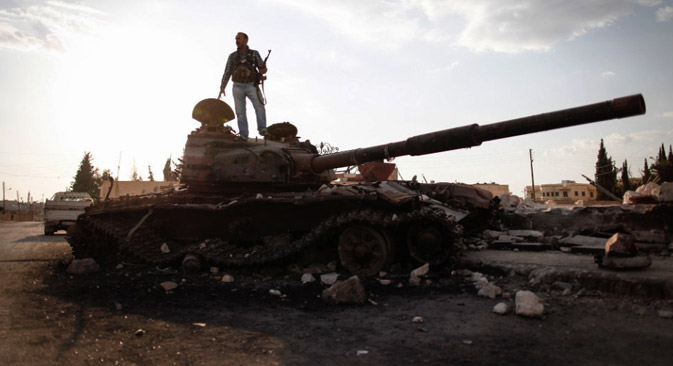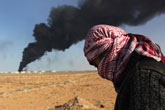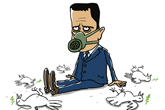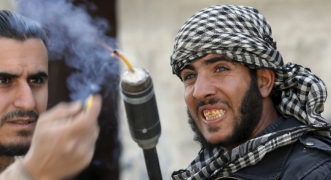Kerry, Lavrov give green light to destroying Syria chemical weapons

The Syrian chemical weapons would be taken under international control. In order to destroy it, it would be necessary to build a production base. Source: AP
U.S. President Barack Obama, speaking to the nation, summarizing the three-day talks on Syria, said that there has been progress and diplomatic consultations should continue.
Russian Foreign Minister Sergei Lavrov praised the talks as "excellent." It was agreed that Damascus’ chemical weapons would be destroyed "as quickly as possible," documents would be "written professionally," and unnecessary rhetoric would remain on the side. U.S. Secretary of State John Kerry even named a specific target of time. "Our goal is to finish the work by mid-2014,” said the secretary of state. “The equipment, necessary for the production of chemical weapons has to be destroyed by November.” However, to do so will not be easy.
In addition, there is no accurate information about where and in what form these stored weapons are; an investigation is needed. However, this means time. Another problem is that Syria has agreed to give up its chemical weapons under international supervision, but who will perform this and how: Russia, the U.S., NATO, the Arab countries, or China? Furthermore, is the international community, being split between different and often opposite attitudes toward the civil and religious war in Syria, ready for such an agreement?
There is more to follow. Suppose that all parties agree—this would require quite some time. The Syrian chemical weapons would be taken under international control. In order to destroy it, it would be necessary to build a production base. It would be almost impossible to drown the weapons in the ocean, to burn them, or transport them somewhere where there are resources and experience in the utilization of these chemicals. It is very dangerous and in a time of war—madness.
According to the expert at the Russian Green Cross and member of the International Scientific Advisory Board on the Chemical Weapons Convention, Alexander Gorbovsky, the first thing that Syria has to do after it agrees to transfer its chemical weapons to international forces is sign the Convention on the Prohibition of Chemical Weapons, according to the existing procedure to transfer all chemical warfare agents under the control of the OPCW. This organization would take responsibility for their safety and recycling in the future.
Another expert, the former minister of the defense industry and former general director of the Russian Munitions Agency, Zinovy Pak, agrees with Gorbovsky. The final result of the transfer of Syrian chemical weapons would be the recognition that all of it is declared, he says. "If there remain any doubts about it, this will lead to endless debates, and again threats would be raised," says Pak.
"The process will be long lasting. But, if this process really stops mass murder on both sides, then glory to God. Perhaps this will be the first time when chemical weapons played a positive role in the suspension of military conflict," Pak says.
The expert especially stressed that all work must be carried out under the auspices of the OPCW. "Today, there is no other mechanism; in the near future it will not be created." According to Pak, the inspectors of OPCW can inspect almost any military facility, while declaring that they suspect chemical weapons are stored there. "And you have to prove that there are no such weapons. All that takes time," says the former minister.
There is another aspect in the agreement between Russia and the U.S. on Syria's chemical disarmament. This is setting a precedent, by which experience in Damascus could be transferred to the other "hard-headed capitals.”
The script, as predicted by some international experts, may be as follows. First, in a state where there is a weapon of mass destruction—chemical or nuclear—chaos is created by external or internal opposition forces, which then leads to civil war. Later a coalition is formed, which is ready, under the pretext of saving the nation from a dictator, to conduct a humanitarian military operation, in order to liberate the country from its stockpiles of weapons of mass destruction and overthrow the hated regime. Thus, by the decision of the U.N. Security Council—and, if the institution does not agree to it, then bypassing its resolutions, as was done in 2003 in Iraq—the operation is carried out.
A similar fate has missed Syria so far. Yet there is Iran, which is suspected of continuing work on developing a nuclear weapon. There is also Pakistan, where the terrorists from al-Qaeda are getting closer and closer to the creation of nuclear weapons. There is the issue of North Korea, with its work on the creation of nuclear-missile weapons and, according to some estimates, stocks of chemical warfare agents (Pyongyang is one of the few countries that has not signed the Convention on the Prohibition of Chemical Weapons and their Destruction). Thus, the Syrian precedent may provide a greater perspective.
All rights reserved by Rossiyskaya Gazeta.
Subscribe
to our newsletter!
Get the week's best stories straight to your inbox


